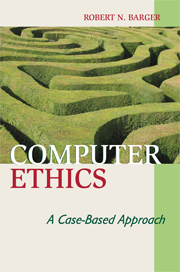Book contents
- Frontmatter
- Contents
- Preface
- Acknowledgments
- 1 Introduction
- 2 The Computer as a Humanizing Agent
- 3 Philosophic Belief Systems
- 4 A Philosophic Inventory
- 5 The Possibility of a Unifying Ethical Theory
- 6 The Ethical Decision-Making Process
- 7 Psychology and Computer Ethics
- 8 The Computing Field as a Profession
- 9 Computer-Related Codes of Ethics
- 10 Computer Ethics and International Development
- 11 Robotics and Ethics
- 12 Theft and Piracy Concerns
- 13 Cases Concerning Theft and Piracy
- 14 Privacy Concerns
- 15 Cases Concerning Privacy
- 16 Power Concerns
- 17 Cases Concerning Power
- 18 A Miscellaneous Collection of Cases
- 19 Parasitic Computing Case
- Appendix: Topics for Presentations, Discussions, and Papers
- Notes
- Selected Bibliography
- Index
7 - Psychology and Computer Ethics
Published online by Cambridge University Press: 05 June 2012
- Frontmatter
- Contents
- Preface
- Acknowledgments
- 1 Introduction
- 2 The Computer as a Humanizing Agent
- 3 Philosophic Belief Systems
- 4 A Philosophic Inventory
- 5 The Possibility of a Unifying Ethical Theory
- 6 The Ethical Decision-Making Process
- 7 Psychology and Computer Ethics
- 8 The Computing Field as a Profession
- 9 Computer-Related Codes of Ethics
- 10 Computer Ethics and International Development
- 11 Robotics and Ethics
- 12 Theft and Piracy Concerns
- 13 Cases Concerning Theft and Piracy
- 14 Privacy Concerns
- 15 Cases Concerning Privacy
- 16 Power Concerns
- 17 Cases Concerning Power
- 18 A Miscellaneous Collection of Cases
- 19 Parasitic Computing Case
- Appendix: Topics for Presentations, Discussions, and Papers
- Notes
- Selected Bibliography
- Index
Summary
Introduction
In previous chapters we have looked at the question of right and wrong behavior from the viewpoint of philosophical ethics. Now we will compare this approach with another way of looking at right and wrong behavior – the approach of developmental psychology.
Psychology takes a scientific approach to the study of human behavior. It uses experimental investigative procedures to study how human behavior develops. Psychologists examine questions of right and wrong in the branch of psychology known as moral development. One of the most famous researchers in this branch was Lawrence Kohlberg. A brief review of his work follows.
Lawrence Kohlberg's Stages of Moral Development
Lawrence Kohlberg was, for many years, a professor at Harvard University and director of its Center for Moral Education. He became famous for his research on moral development, which began in the early 1970s. He started as a developmental psychologist and then moved to the field of moral education. He was particularly well known for his theory of moral development that he popularized through research studies. He believed that justice was a central concept in moral education and he spent a good deal of time experimenting with how to make schools into “just communities” by having students make decisions through the use of democratic processes.
His theory of moral development was dependent on the thinking of the Swiss psychologist Jean Piaget and the American philosopher John Dewey. He was also inspired by the work of James Mark Baldwin, an early developmental psychologist.
Information
- Type
- Chapter
- Information
- Computer EthicsA Case-based Approach, pp. 80 - 84Publisher: Cambridge University PressPrint publication year: 2008
